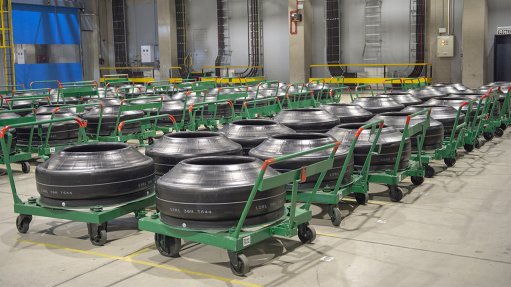
WORKING TIRELESSLY After being looted in July, Sumitomo Rubber South Africa has tried to minimise the impact on dealers
Competition Commission South Africa’s Automotive Aftermarket Guidelines, which came into effect in July, after being published in January, can be “hugely beneficial to motorists”, says tyre manufacturer and distributor Sumitomo Rubber South Africa CEO Lubin Ozoux.
“However, consumers still have a responsibility to use quality automotive aftermarket brands that are recommended by a reputable, accredited workshop that knows its vehicle and uses the right products and parts.”
Ozoux believes that all industry players also have a responsibility to provide sound and responsible advice for consumers, thereby enabling them to make informed and safe choices.
As an international company with a local manufacturing operation, Sumitomo Rubber South Africa will continue to focus on ensuring that its franchises can provide this kind of advice, supported by expert training and service excellence.
Ozoux emphasises that consumer safety needs to remain the primary concern of tyre retailers and manufacturers, with their having “a great responsibility” to educate consumers on the best replacement options without compromising on the technical attributes of the vehicle.
“Tyres and brake pads are safety-related wear items and there should never be any cutting of corners when it comes to safety-critical vehicle components.”
Further, the company is focused on providing value at a fair price. This includes ensuring quality, safety and a package of services for tyre purchases for direct customers and end-consumers.
To reinforce customer confidence, Sumitomo Rubber South Africa launched Dunlop Sure at the end of last year. Dunlop Sure is a value-added extra package of services intended to provide further benefits for dealers when selling the company’s products, while providing extra peace of mind for consumers.
“We will continue to focus on research, development and proactive testing as priorities to provide world-class tyre manufacturing in South Africa,” Ozoux says.
The company tests its tyres rigorously in all applications, with high regard for feedback from customers, he notes.
Working to Rebuild
While members of the National Association of Automotive Component and Allied Manufacturers, such as Sumitomo Rubber South Africa, welcome the forward momentum of the Automotive Aftermarket Guidelines and all the other efforts to rebuild the industry after the onslaught of Covid-19, the riots that broke out in several locations across the country in July served as an unfortunate additional setback.
For example, the company’s Westville warehouse in Durban, KwaZulu-Natal, was invaded unlawfully and vandalised during the unrest, leading to an estimated R97.7-million loss in stock and assets.
More than 96 000 items were stolen or damaged, including tyres and tyre accessories. Assets and stock that were affected in this manner by the riots and looting included truck and bus, passenger/sport utility vehicle (SUV) tyre stock, motorcycle tyre stock, as well as some tyre-testing equipment.
Ozoux tells Engineering News that the tyres, which began circulating in the market illegally after the unrest, have been predominantly passenger/SUV and motorcycle tyres.
After being robbed of its stock, Sumitomo Rubber South Africa has been working tirelessly to minimise the impact on dealers and safeguard their businesses. Significant efforts have been made to remove looted tyres from the market, which has involved fostering public awareness against buying them.
Ozoux says the company has been working closely with authorities and other tyre manufacturers to ensure the retrieval of as many of these tyres as possible. To this end, a Looted Tyres Hotline has been set up as a way of supporting rebuilding and recovery.
“Leads generated from the hotline have been passed on to the South African Police Service who have been diligently following them up. Moreover, we have urged customers to approach purchases from unknown retailers and individuals with caution and to purchase tyres only from reputable manufacturers and suppliers.”
The company has also urged tyre fitment centres not to fit loose tyres without a valid proof of purchase.
Further, Sumitomo Rubber South Africa has been striving to prevent potential road safety issues wrought by the thousands of looted tyres being fitted informally and incorrectly by untrained people who might not know how to match and fit the most suitable tyres according to a vehicle’s technical attributes.
Ozoux says that the lack of proof of legitimate purchase and fitment puts the customer in a compromised situation, should performance or insurance issues arise from the use of these tyres.
To prevent any further damage to the company’s stock and assets in future, the company has intensified the security presence at its other sites in Ladysmith, KwaZulu-Natal; Jet Park, in Gauteng; Cape Town, in the Western Cape; Bloemfontein, in the Free State; and Gqeberha and East London, in the Eastern Cape.
“We will reconsider our distribution strategy. At certain sites, we are also looking to work closer with other businesses in the area to discuss measures we can take as a collective,” Ozoux explains.
He says the company is also putting measures in place to ensure that, should any future threat suddenly arise, its security presence can be swiftly increased.